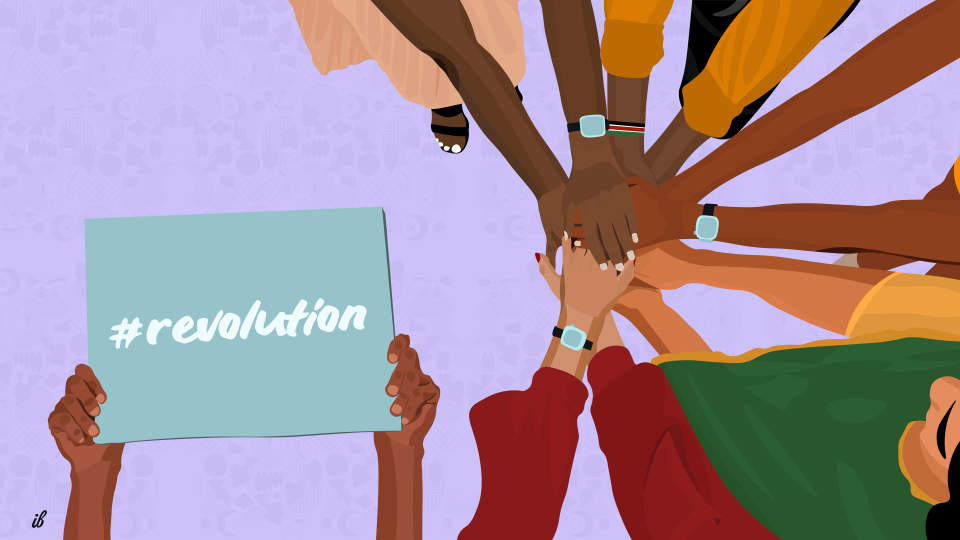
Illustration by Ibrahim Kizza for GenderIT
Feminist and activist movements around the world have been working tirelessly to fight for equality and inclusion in public and private spaces, while demanding justice for inequalities. While there continue to be setbacks of various kinds, including colonial, societal, economic, cultural, authoritarian and legal challenges, there exist instances of success that have enabled structurally silenced women and gender diverse communities to access, exercise their rights and pushback against the rising backlash.
Despite powerful movements led by feminists and activists like the ones in Sudan, Lebanon, Uganda, Kenya, India and Bangladeshthat pave the way for the dismantling of gender based violence, equity-denied communities still face persistent violence and backlash, reminding us why these movements are still so urgently needed. The Association for Progressive Communications (APC), through its members and partners across diverse regions, is closely connected with at-risk communities worldwide. Through these collaborations, a striking reality emerges: despite vast differences in language, socio-political contexts, religion, and culture, gender-based violence is a pervasive and shared experience everywhere. From India to Bangladesh, Kenya to Uganda, Lebanon, Mexico, Brazil, and beyond, this violence manifests in many forms, but the severity of its impact on communities is universally devastating, compounding existing social inequalities.
The Our Voices Our Futures (OVOF) consortium elevates voices from across the Global South, aiming to amplify those of structurally silenced women, including the LBQTQIA+* people within their communities. APC mentions, “This initiative is unique among myriad interventions targeting gender equality and women’s rights because it specifically aims to achieve the inclusion of [structurally] silenced women within broader feminist movements, where fragmentation has led to the historical exclusion of structurally silenced women even, at times, from feminist movements themselves.”
Over the past four years, the OVOF project has worked to shed light on the deep-rooted biases, inequalities, discrimination, and violence that structurally silenced women and people endure. More importantly, the project amplifies their inclusion in online, public spaces, and on legal and policy levels, through movement building, strategic use of technology to support open and safe online spaces, feminist holistic protection to enable advocacy for rights and policy change, and the creative use of arts, media and culture as influential tools to challenge social norms, shape public opinion and counter restriction of expression. Through amplifying these stories, the consortium aims to gather evidence of widespread violence, forging a path for collective strategies that safeguard the rights, dignity, and futures of those living on the margins.
This special edition of GenderIT brings together five powerful stories from OVOF project partners in Bangladesh, Kenya, Uganda, and India, spotlighting the lived struggles of structurally silenced women and people. These stories capture not only the harsh realities of gender-based violence – violence that magnifies existing inequalities – but also the fierce resilience and community-driven movement-building aimed at advancing gender justice.
Centred on those directly impacted by structural violence, these narratives shed light on how such violence systematically excludes marginalised groups from public discourse and decision-making while further entrenching victimisation. The authors go beyond documenting trauma and abuse; they highlight the transformative power of individual and collective action. Through community-led mobilisation, they show how these actions are reshaping social and political landscapes, reimagining futures for structurally silenced communities, and redefining the possibilities of change towards greater access to rights and equality for all.
These stories serve as a critical reminder of the relentless struggles and organising efforts to counter violence – efforts that confront the authoritarianism reflected into policies and laws, which often limit access to safe spaces for women and LGBTQIA+ communities. By amplifying these voices, this edition reinforces the urgency of dismantling the policies and practices that keep these communities unsafe and underserved, bringing to the forefront the hope and action that are changing the narrative.
The five stories include:
-
The Fate of Bangladesh’s Cyber Security Act? A Swift Repeal
This article emphasises that where regulations are an important step to make public and online spaces safe for structurally silenced women, it also reminds us that most legislations that are proposed to regulate online spaces go beyond their intended scope and more often than not infringe on human rights of citizens. Making a direct reference to Bangladesh’s Cyber Security Act and its various iterations, Parsa Sajid and durdana farid argue that reforming a piece of legislation that is intended to stifle civil liberties will only reinforce the state’s overreach on rights, and will promote the authoritarianism even when the country has gone through transformative events to challenge the same authorities that the law is the product of. They say, “It is conceivable that even without any of these laws, the autocratic regime would find other means to suppress and penalise dissent and free expression, but these policies legalised and intensified its tyrannical tendencies.”
The authors say that in order to rid Bangladesh of any leftover impact of the past regime, the Cyber Security Act must be repealed – a demand that is in line with the citizen-led movement that made history in the country. Read the article here.
-
Building Resilience in Uganda: The Importance of Online Solidarity Movements for Structurally Silenced Women
Many countries across the world are leveraging online spaces to mobilise communities for solidarity movements, and Uganda is no different. Esther Nyapendi highlights that where online solidarity movements are helping structurally silenced women and LGBTQIA+ communities in an increasingly hostile society, these movements are subjected to severe violence and backlash owing to the patriarchal and homophobic society that pushes the oppressed individuals further to the margins. These threats are not just online but also reflect in various ways in the public spheres. Regardless, these movements pave way for structural change in policies and societal norms. Esther says, “It is then crucial to continue supporting and expanding these online movements, ensuring that structurally silenced women have the tools, resources, and platforms they need to advocate for their rights and resist silencing. In doing so, we can help create a more inclusive and equitable digital landscape, both in Uganda and across the Global South."
Read the article here.
-
Ctrl+Alt+ Resist: “Hashtagging” The Kenyan Revolution
In this article, Maureen Kasuku shares her own experience of witnessing and then being part of the online solidarity movements that are defining a revolution around how rights are accessed and exercised in Kenya. She emphasises on the role of hashtags and online campaigns to put gender justice in spotlight, mobilising people across spectrums to demand rights and protections for structurally silenced women and queer individuals. These campaigns and movements created a sense of community amongst those oppressed, enabling an understanding of shared struggles. Maureen recalls that during the #RejectFinanceBill movement, “This was the first time in the history of this former British protectorate that the citizenry exerted their power in numbers by using technology to push back against violence, challenge state hegemony, policing the police, shaping public opinion, calling for accountability, and spotlighting and boycotting individuals and businesses in a way that has never been witnessed before.”
She aptly concludes, “the revolution will be hashtagged.” Read the article here.
-
Under Siege: How Cultural, Political, and Religious Forces Threaten Gender Rights in Bangladesh
In this article, Parsa Sanjana Sajid explores the challenges of gender and queer justice in Bangladesh, focusing on systemic discrimination fueled by colonial-era laws, cultural conservatism, and globally resonant right-wing ideologies. The article critiques how misinformation campaigns, often intertwined with moral panic and nationalism, amplify backlash against LGBTQIA+ communities, framing them as threats to tradition and social order. She writes, “This propaganda is not just misinformation, rather there is a deeper sociological phenomenon at play. And not also simply a matter of fake news vs fact, but rooted in ideological motivations. The real challenge isn’t just finding some unvarnished truth, but unwrapping and understanding the political, social, and material foundations of a growing trend.”
Parsa also scrutinises the mainstream feminism and state approaches to reinforce surveillance and biological determinism while failing to address deeper inequities. The piece emphasises the need for transformative, inclusive advocacy beyond capitalist and medico-legal frameworks.
Read the article here.
-
Global South Online Solidarity Movements: Whose online solidarity movements are we talking about?
To conclude the edition, in this timely article from India, Brindaalakshmi K asks a critical question, pointing out the gap in digital access that defines who gets to have a voice in the solidarity movements and who gets to talk about violence they face and be heard for their demands for rights and protection. It is imperative to acknowledge in our struggles for gender justice and equality as we increasingly digitise movements, that technology is a privilege for most of those living with and experiencing violence of various kinds. In this case, then, digital divide emerges as a form of violence that needs to be countered. Brindaa also talks about the various other inequalities amongst the movements and how they are structured – financial inequalities when it comes to voluntary engagements in mobilisation efforts, the power imbalance within the movements, lack of action from the government and tech companies to bridge various gaps that exist in society. Brindaa argues, “Maybe each of us could ask ourselves: what defines my power? Is my power in controlling other human beings using all different human constructs such as gender identities and hierarchies, sexual orientation, race, caste, religion, eating habits, class, education status, technology, organisational hierarchy, funding, human rights, feminism and any other -isms? Where does this need stem from? How can I let go of the need to control other human beings? How can I value myself and others better without the need to control?”
There is a clear need to revisit who controls the power within online and offline solidarity movements, and who gets to have a voice. Where are structurally silenced communities and are they heard enough?
Read the article here.
- 165 views






Add new comment